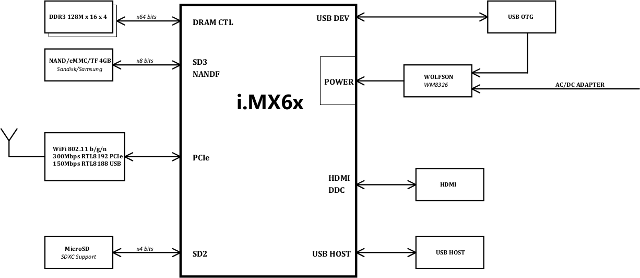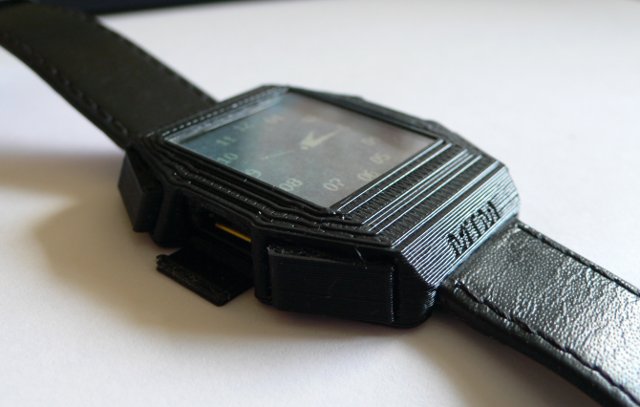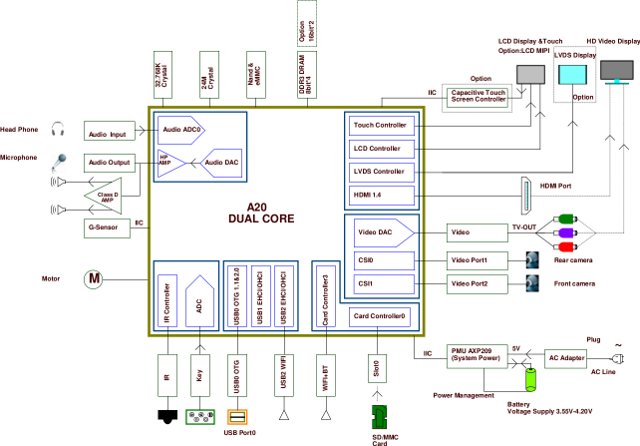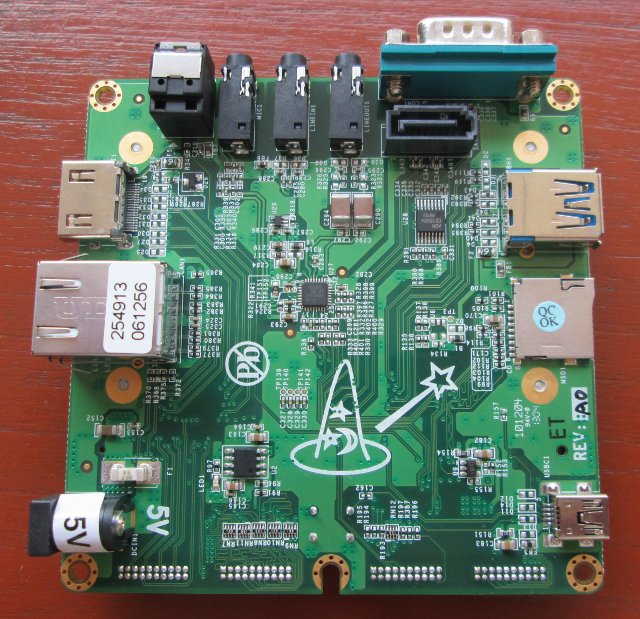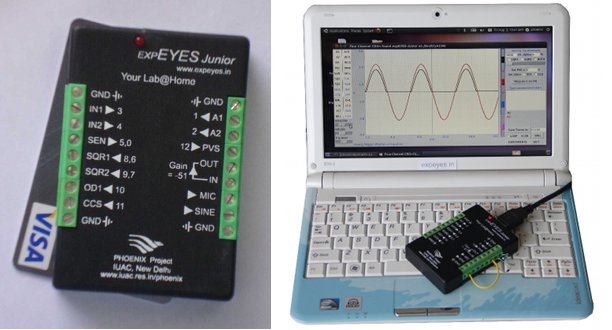We already had the source code for Freescale i.MX6 HDMI TV dongle, and some work has been done on the Linux front by imx6-dongle community to make Ubuntu work on Hi802 and GK802 mini PCs. Today, I’ve just found out Freescale has also released the hardware files and some application notes for their HDMI TV dongle reference platform (MX6x_HDMI_DONGLE). There are 2 files for download: hdmi_dongle_hardware_design_package.rar.zip – Hardware files for i.MX 6 mini PC app_note.rar.zip – Zip file with some hardware application notes Let’s have a look at the hardware design files: wifi_rtl8192ce.zip – Schematics in PDF and DSN (OrCAD) format, gerber files, BoM and manufacturing files for the Wi-Fi module. bom_hdmi_dongle_revb2_20130116_1500.xls – Bill of materials for i.MX 6 HDMI dongle pcb_hdmi_dongle-revb2-20130116_1700.rar – PCB layout (.brd) and gerber files sch_hdmi_dongle_revb2_20130116_1500.rar – Schematics for i.MX6 mini PC in PDF and DSN formats. We also have three application notes: AN4397 Common Hardware […]
Open Source Time Machine #2 – Build A Complete Watch Yourself
There are already some watches such as Texas Instruments ez430-Crhonos and MetaWatch that are used as development platform and let you develop software yourself. Some hardware documentation is usually provided as well, but Energy Micro forums’ member hairykiwi is trying to go a bit further. He created a watch based on EFM32 Cortex M3 MCU and already released the KiCad schematics and gerber files, with 3D printer files and firmware source code to be released once they are ready. The project is called “Open source Time Machine #2” (OTM2). The project makes use of the following components and features: EFM32LG332F256 – Energy Micro Cortex M3 Leopard Gecko MCU with 256KB flash and 32KB SRAM A 128×128 pixel (23.2 x23.2mm visible area) ultra low power Memory LCD from Sharp Microelectronics, Recharge and programming via Micro USB connector. JTAG programming is also available. 150mAh Li-Po Battery + on-board battery fuel gauge IC. […]
AllWinner A20 Linux Source Code, EVB Schematics and Product Brief
Hardware based on AllWinner A20 such as Cloudsto Media PC PRO DRIVEDOCK, should start to be available soon, and resources for developers have been slowly released (or leaked) to the community. AllWinner A20 Source Code The source code for AllWinner A20 and A31 has been released to sunxi-linux a while back, and they have started to clean up the code before hardware becomes available. The code apparently hasn’t made it to sunxi-linux github account just yet, but Linux for A20 has been imported into github at https://github.com/amery/linux-allwinner/tree/import/lichee-3.3/a20-dev. AllWinner A20 is known as sun7i in the code. AllWinner A20 Evaluation Board Schematics and Product Brief Olimex received A20 EVB schematics and product brief from AllWinner earlier this week, and as usual, they promptly uploaded those documents to their github account. The 3-page product brief does not bring anything new, and the data sheet does not seem to be available right now. […]
Wandboard Releases Updated Android and Ubuntu Linux Images and Source Code
Since I’ve received my previous short review of the Wandboard Dual development board, there has been more work on done the platform with new Android and Ubuntu images, Jelly Bean source, Linux SDK release, and git repo setup. I’ve tried the binary images, and had a quick look at the source code and corresponding documentation. Android 4.1.2 Image and Source Code Wanboard has release an improved Android image on the 14th of March which you can download for both Solo and Dual version of the development board with the following Changelog: Fix HDMI audio/playback issue with certain monitor. Add support for wifi on wandboard-dual. Known issue: Might need to turn off “Avoid poor connections” in Wi-Fi ->Advanced to keep connection alive. I’ve given it a try in Wandboard Dual, and it seems Ethernet support is gone (Sorry my mistake, Ethernet IS working, but there’s no indication when it’s connected, and […]
Ubuntu 11.10 on GK802/Hi802 mini PC with 2D/3D and Video Hardware Acceleration
You may remember an Ubuntu 11.10 image was released via Geekbuying early January, but this image would not boot on my Hi802, lacked 2D/3D acceleration, and to my knowledge there hasn’t been any update since then. So hope of proper Linux support on the device was fading, until the community discovered Freescale released patches for i.mx6 HDMI dongles, developers setup the imx6-dongle community, and after a lot of work, mainly by three members: Jasbir, Dmitriy (rz2k) and James, there’s now GPU and VPU support on Ubuntu 11.10. Here’s a summary of the current status: Wifi working. External SD working Matched IOMUX configuration to align with the Android image. Stripped out unnecessary device initialisation from the original HDMI dongle source. Enabled EGL and GLES HW Acceleration in Ubuntu. Unity desktop might be partially HW accelerated (TBC) Jasbir uploaded a video to YouTube to show the progress, and it looks pretty good. […]
Zopfli Library Improves Zlib Compression by 3 to 8%
Google developers have released a new compression library called Zopfli. This library, written in C, is compatible with zlib, yet provide a better compression, more exactly 3 to 8% according to Google. This library can be used on servers for better compression in order to save bandwidth, as well as delivering web pages faster. Since it’s fully compatible with zlib, the web browsers do not need to be changed. The only drawback is that it’s several magnitude slower than zlib, so it’s better used for static content that is compressed once, and sent over the Internet many times, and it may not be a good choice for dynamic content. The source code is available at https://code.google.com/p/zopfli/, so let’s try it. Get the code and build zopfli:
|
1 2 3 |
git clone https://code.google.com/p/zopfli/ cd zopfli make |
Different levels of compression are available:
|
1 2 3 4 5 6 7 8 9 10 11 12 13 14 15 16 17 |
./zopfli -h Usage: zopfli [OPTION]... FILE -h gives this help -c write the result on standard output, instead of disk filename + '.gz' -v verbose mode --gzip output to gzip format (default) --deflate output to deflate format instead of gzip --zlib output to zlib format instead of gzip --i5 less compression, but faster --i10 less compression, but faster --i15 default compression, 15 iterations --i25 more compression, but slower --i50 more compression, but slower --i100 more compression, but slower --i250 more compression, but slower --i500 more compression, but slower --i1000 more compression, but slower |
For testing purpose, I’ve just saved this blog as one html file (test.html – 67275 bytes) […]
$35 expEYES Junior Transforms the Raspberry Pi, Aakash2 Tablet or any Linux Powered Device into an Electronics Lab
I remember in high school in France, our class only had 2 oscilloscopes and few other electronics equipment, needless to say I did not actually get to use an oscilloscope until I went to university. It would have been nice to be able to play around with oscilloscopes, frequency generators, etc… earlier, but due to budget constraints, this was not possible. Dr Ajith Kumar, a scientist working with the Inter University Accelerator Centre of India, has spent several years working on an ultra low cost electronics lab composed of an oscilloscope and a signal generator to provide students attending schools that cannot afford regular equipments. This learning & experimentation tool is called expEYES, and a prototype was demonstrated last year with the Raspberry Pi. At the end of last year, the final version called expEYES Junior (aka expEYES 2.0) was announced, and is now available to schools and hobbyists in […]
mbed 2.0 SDK Released, becomes Open Source and Supports $12.95 Freescale Freedom Board
The mbed community has had a pretty busy week, with first the announcement that mbed SDK would become open source, the release of mbed 2.0, and finally support for the low cost Freescale Freedom board FRDM-KL25Zpowered by Kinetis Cortex M0+ KL25Z MCU. mbed becomes open source The mbed Software Development Kit (SDK), a C/C++ MCU software platform, has always been free (as in free beer) for both commercial and noncommercial use, and the large community around mbed has written tons of code for ARM microcontrollers. But now that the SDK has now a stable API, and the developers achieved transparent portability for code based on the SDK across multiple controllers and multiple toolchains, they decided to release the SDK source under an Apache 2.0 license. Although sharing modifications is encouraged, this license allows users to keep the changes closed if they wish to do so. mbed developers explain that the 3 […]


